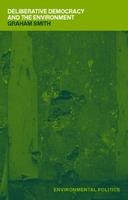Contemporary democracies are frequently criticized for failing to respond adequately to environmental problems and our political institutions are often charged with misrepresenting environmental values in decision-making processes. In this innovative volume, Graham Smith argues that the enhancement and institutionalisation of democratic deliberation will improve reflection on the wide range of environmental values that citizens hold.
Drawing on theories of deliberative democracy, Smith argues that institutions need to be restructured in order to promote democratic dialogue and reflection on the plurality of environmental values.
Deliberative Democracy and the Environment makes an important contribution to our understanding of the relationship between democratic and green political theory. Drawing on evidence from Europe and the United States, it systematically engages with questions of institutional design.

